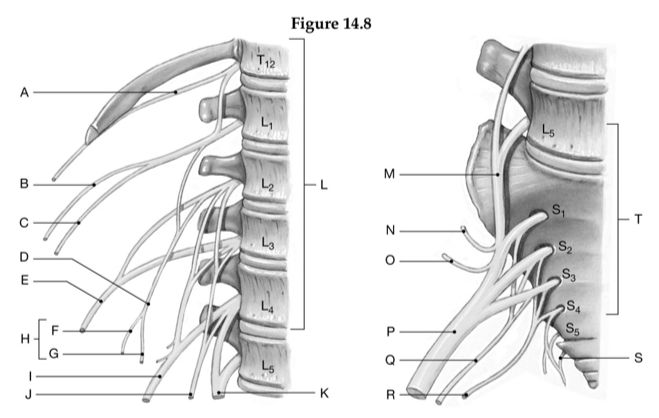Using the figure above, identify the labeled part.

1. Label A: ______________________________
2. Label B: ______________________________
3. Label C: ______________________________
4. Label D: ______________________________
5. Label E: ______________________________
6. Label F: ______________________________
7. Label G: ______________________________
8. Label H: ______________________________
9. Label I: ______________________________
10. Label J: ______________________________
11. Label K: ______________________________
12. Label L: ______________________________
13. Label M: ______________________________
14. Label N: ______________________________
15. Label O: ______________________________
16. Label P: ______________________________
17. Label Q: ______________________________
18. Label R: ______________________________
19. Label S: ______________________________
20. Label T: ______________________________
1. T12 subcostal nerve
2. Iliohypogastric nerve
3. Ilioinguinal nerve
4. Genitofemoral nerve
5. Lateral femoral cutaneous nerve
6. Femoral branch
7. Genital branch
8. Branches of genitofemoral nerve
9. Femoral nerve
10. Obturator nerve
11. Lumbosacral trunk
12. Lumbar plexus
13. Lumbosacral trunk
14. Superior gluteal nerve
15. Inferior gluteal nerve
16. Sciatic nerve
17. Posterior femoral cutaneous nerve
18. Pudendal nerve
19. Co1
20. Sacral plexus
You might also like to view...
The cerebral aqueduct runs through the hindbrain.
Answer the following statement true (T) or false (F)
Which bones articulate with the zygomatic bone?
A. Frontal, temporal, and maxilla B. Temporal and maxilla C. Temporal and parietal D. Frontal, parietal, and occipital E. Temporal, sphenoid, and maxilla
A patient has lost vision on the left side of both eyes. The patient has likely suffered damage to ________
A) the optic chiasm B) the retinas of the eyes C) the optic nerves D) the right optic tract
Because of their location, swollen palatine tonsils may interfere with
A. both breathing and swallowing. B. swallowing only. C. breathing only. D. neither breathing nor swallowing.